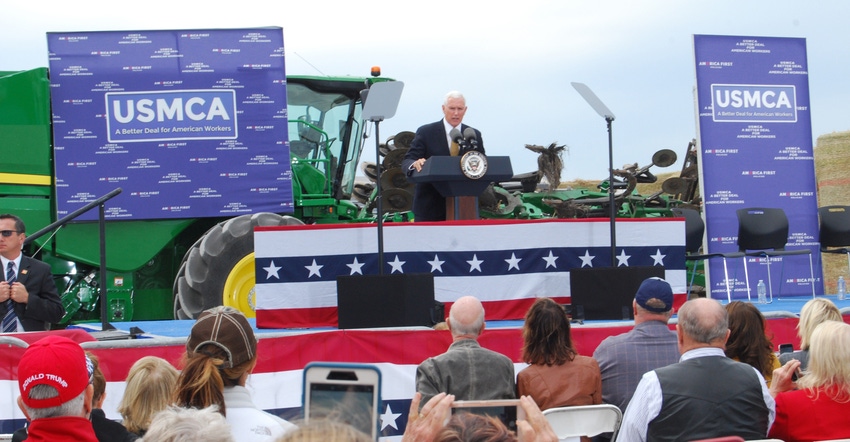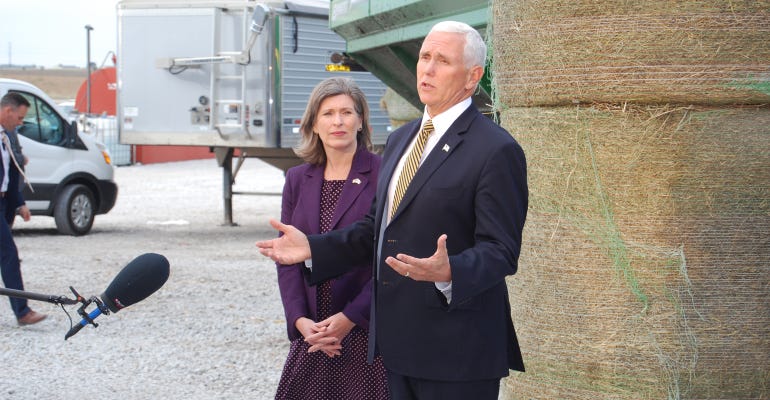October 17, 2019

It’s been almost a year since President Donald Trump and the leaders of Canada and Mexico signed the U.S.-Mexico-Canada Agreement. The new agreement could be a boost for U.S. agriculture, but it’s still waiting approval by Congress. In a visit to Iowa last week, U.S. Vice President Mike Pence said it’s time to get it done.
Speaking to a crowd gathered at the Manning family farm near Waukee, west of Des Moines, Pence said, “I came to Iowa today to turn up the heat. It’s time for the Democrats in Congress to do their job, put politics aside, and pass the USMCA this year.”
In his speech, Pence focused on USMCA. The proposed agreement is a key concern for Iowa farmers who sold $10.3 billion in soybeans, pork, corn and other ag products to other countries in 2017, before Trump’s trade war with China began.
Canada and Mexico are two of the biggest buyers of Iowa’s total exports. In 2018, Iowa exported a total of $14.3 billion in ag products and manufactured goods to the world, according to the Office of the U.S. Trade Representative.
Why NAFTA needs replacing
Pence is pushing for passage of USMCA, a replacement for the 25-year-old North American Free Trade Agreement, saying it would boost the U.S. and Iowa economies, especially for manufacturing industries and farming. He urged those in attendance to reach out to Iowa Democratic members of the U.S. House of Representatives — Cindy Axne, Abby Finkenauer and Dave Loebsack — to reinforce the need for USMCA. “Tell them Iowa needs the USMCA,” Pence said.
USMCA would be a big win for Iowa and U.S. agriculture, he noted. “We need to update the NAFTA agreement, which was passed in 1994. Canada and Mexico are important trading partners for U.S. agriculture, as our first- and third-largest export markets for ag products. In 2018, under the current NAFTA, Iowa exported $6.6 billion worth of products to Canada and Mexico. But NAFTA was enacted when many of the technologies we use today didn’t even exist, so today there are virtually no protections for many of the innovations we now take for granted.
“USMCA will create stronger protections for digital trade and guarantee the freedom to move digital data between Mexico, Canada and the U.S. by prohibiting any country from blocking it.”
USMCA benefits
Pence said USMCA is a state-of-the-art trade agreement, and if it becomes law, it could serve as a template for trade deals in the future. He said it will remove unfair restrictions by Canada on American ag products such as dairy and wheat, and increase market access for U.S. poultry producers.
An International Trade Commission study says USMCA will add more than $68 billion to the U.S. economy and create an additional 176,000 American jobs. Under the deal, U.S. exports to Canada are expected to increase by 5.9%; exports to Mexico are expected to grow 6.7%; total U.S. food and ag exports are expected to increase by $2.2 billion.
Iowa Gov. Kim Reynolds introduced Pence to the audience at the Manning farm. “USMCA will create new opportunities for our families, farmers, manufacturers and small businesses while opening new markets for our exports,” said Reynolds said.

PASSAGE NEEDED: “If given a level playing field on trade, American farmers can outcompete anyone. When we get the USMCA done, it will be a big win for our farmers,” says U.S. Vice President Mike Pence, standing with U.S. Sen. Joni Ernst.

U.S. Sens. Chuck Grassley and Joni Ernst, both Republicans from Iowa, joined Pence in support of USMCA. “It’s time for Congress to pass USMCA,” Ernst told the crowd. “This is not about politics. This is about the livelihood of Americans. America wants USMCA. I will fight to make sure we get this trade agreement over the finish line.” Grassley also said passage of USMCA is his top priority.
Grassley said in his conversations with U.S. House Speaker Nancy Pelosi, D-Calif., he believes “she wants to get to say yes” on this trade deal. “I was glad to hear her say that impeachment politics won’t get in the way of legislative action,” he said. “I hope that is true. But the clock is ticking, and actions will speak louder than words. As House speaker, it’s up to Nancy Pelosi to allow the USMCA legislation to be brought to the House floor for debate and a vote.”
Needs to be ratified soon
Grassley said if USMCA isn’t brought up for discussion and voted on by Congress before the end of this year, he fears it will get mired in politics during 2020, an election year and won’t be voted on in 2020.
U.S. soybean farmers have already seen the benefits of trade with Canada and Mexico under the existing NAFTA. Since NAFTA began 25 years ago, U.S. soybean exports have quadrupled to Mexico and doubled to Canada. Exports of U.S. soy to Canada and Mexico were almost $3 billion in 2017, according to the American Soybean Association. Mexico is now the second-largest export market for U.S. soybeans and soymeal.
For farmers such as Pat Swanson of Ottumwa, who serves on the Iowa Soybean Association board of directors, the vice president’s recent visit to Iowa was reassuring. “We heard how important the USMCA agreement is,” she said. “It needs to get done — and soon. We need the assurance that we have a trade agreement in place with our neighbors — Mexico and Canada — to sell the products we are harvesting right now.”
Jen Sorenson, communications director for Iowa Select Farms, one of the largest hog production and contracting companies in the U.S., spoke on a panel ahead of Pence’s speech. She said Iowa Select will produce about 1.5 million pounds of pork in 2019.
“We will be exporting about 180 million pounds of pork to Mexico and Canada, which tells you how important exports are to Iowa and Iowa farmers,” she said. “If that market was taken away, it would be equal to about 140 of our hog farms going out of production. Even more important, it would be a $60 million economic loss to the state of Iowa every year. The bottom line: These trade agreements are very important to our state and its farmers.”
You May Also Like




